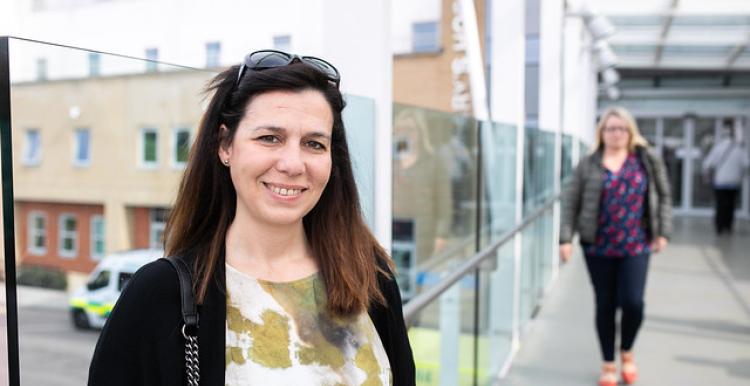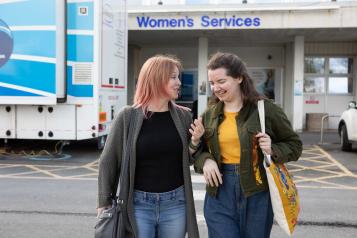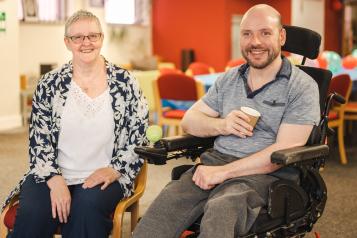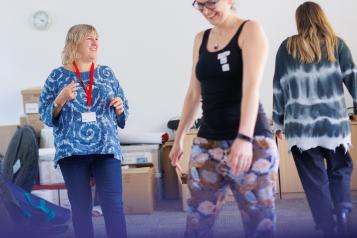First Women's Health Strategy in England to tackle 'gender health gap'

- Government promise major new research on women’s health issues to increase understanding of female-specific health conditions and tackle the data gap to ensure diagnosis and treatment work for women.
- Government will ensure all doctors are trained to provide the best care to women by introducing mandatory specific teaching and assessment on women’s health for all graduating medical students and incoming doctors.
- £10 million for breast screening programme to provide 25 new mobile breast screening units for areas with the greatest challenges in screening uptake.
Your feedback has directly influenced this strategy: we held monthly women's health discussion groups and shared your feedback as part of the Government's call for evidence. Many of our members, partners and residents also shared their experiences of women's health services as part of the Government's call for evidence.
The call for evidence generated almost 100,000 responses from individuals across England. Building on the Government's Vision for Women’s Health, the strategy sets ambitions to tackle deep-rooted, systemic issues within the health and care system to improve the health and wellbeing of women, and reset how the health and care system listens to women.
The strategy includes key commitments around:
- new research and data gathering.
- the expansion of women’s health-focused education and training for incoming doctors.
- improvements to fertility services.
- ensuring women have access to high-quality health information.
- updating guidance for female-specific health conditions like endometriosis to ensure the latest evidence and advice is being used in treatment.
Women live on average for longer than men but spend more of their life in poor health, often limiting their ability to work and participate in day-to-day activities. Closing the gender health gap and supporting women to live well will not only benefit the health and wellbeing of women, but the health of the economy.
Responses to the call for evidence highlighted a need for greater focus on women-specific health conditions, including fertility and pregnancy loss, and gynaecological conditions such as endometriosis, which affects 1 in 10 women.
To support progress already underway in these areas, the strategy aims to:
- provide a new investment of £10 million for a breast screening programme, which will provide 25 new mobile breast screening units to be targeted at areas with the greatest challenges in uptake and coverage. This will:
- provide extra capacity for services to recover from the impact of the coronavirus (COVID-19) pandemic
- boost uptake of screening in areas where attendance is low
- tackle health disparities
- contribute towards higher early diagnosis rates in line with the NHS Long Term Plan
- remove additional barriers to IVF for female same-sex couples. There will no longer be a requirement for them to pay for artificial insemination to prove their fertility status and NHS treatment for female same-sex couples will start with 6 cycles of artificial insemination, prior to accessing IVF services, if necessary
- improve transparency on provision and availability of IVF so prospective parents can see how their local area performs to tackle the ‘postcode lottery’ in access to IVF treatment
- recognise parents who have lost a child before 24 weeks through the introduction of a pregnancy loss certificate in England
- ensure specialist endometriosis services have the most up-to-date evidence and advice by updating the service specification for severe endometriosis, which defines the standards of care patients can expect. This sits alongside the National Institute for Health and Care Excellence (NICE) review of its guideline on endometriosis
This will support the Government's aim that national healthcare services consider women’s needs specifically and by default, and that women can access services that meet their reproductive health needs throughout their lives.
Tell us your experience
We've been running a programme of feedback events on women's health, and your experiences have directly fed into the Government's work.
Please continue to share with us your experiences of women's health and care services. You might have lived experience of:
- Painful periods
- Hysterectomy
- Endometriosis
- Polycystic ovaries
- Breast cancer/screening
- Gynaecological cancers
- Peri/menopause
- HRT
- Antenatal/post natal care
- Maternity care
- Maternal mental health (including antenatal and post-natal depression)
...Or anything else that affects women! We work with local services across the Bedfordshire, Luton and Milton Keynes Integrated Care Partnership to secure improvements to local services.
Let's Talk: Menopause
In February 2022, we carried out research into women's experiences of perimenopause, menopause and post menopause.
The purpose was to explore participants' experiences of menopause related services in Milton Keynes with a view to understanding how the menopause service provision and pathway could be improved.
Join us for our Women's Monthly discussion group
If you'd like to join us to talk about your experiences of women's health issues, get in touch so we can keep you updated on the event schedule.
Events tend to be small, friendly, approachable and non-judgemental. We're here to share experiences and offer support.
Email us now on:


